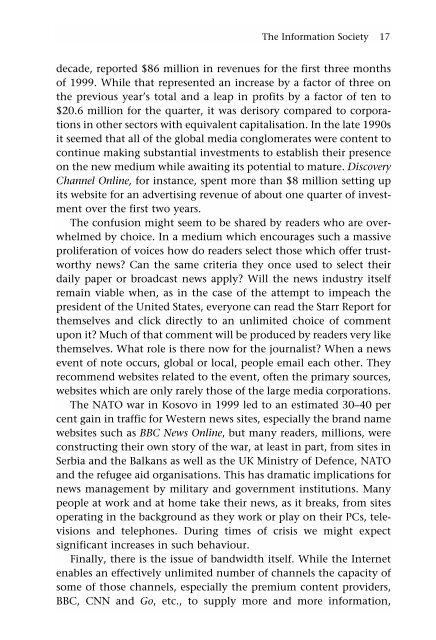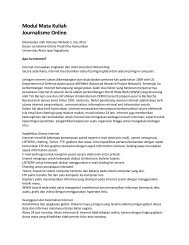Online Journalism - Ayo Menulis FISIP UAJY
Online Journalism - Ayo Menulis FISIP UAJY
Online Journalism - Ayo Menulis FISIP UAJY
Create successful ePaper yourself
Turn your PDF publications into a flip-book with our unique Google optimized e-Paper software.
The Information Society 17<br />
decade, reported $86 million in revenues for the first three months<br />
of 1999. While that represented an increase by a factor of three on<br />
the previous year’s total and a leap in profits by a factor of ten to<br />
$20.6 million for the quarter, it was derisory compared to corporations<br />
in other sectors with equivalent capitalisation. In the late 1990s<br />
it seemed that all of the global media conglomerates were content to<br />
continue making substantial investments to establish their presence<br />
on the new medium while awaiting its potential to mature. Discovery<br />
Channel <strong>Online</strong>, for instance, spent more than $8 million setting up<br />
its website for an advertising revenue of about one quarter of investment<br />
over the first two years.<br />
The confusion might seem to be shared by readers who are overwhelmed<br />
by choice. In a medium which encourages such a massive<br />
proliferation of voices how do readers select those which offer trustworthy<br />
news? Can the same criteria they once used to select their<br />
daily paper or broadcast news apply? Will the news industry itself<br />
remain viable when, as in the case of the attempt to impeach the<br />
president of the United States, everyone can read the Starr Report for<br />
themselves and click directly to an unlimited choice of comment<br />
upon it? Much of that comment will be produced by readers very like<br />
themselves. What role is there now for the journalist? When a news<br />
event of note occurs, global or local, people email each other. They<br />
recommend websites related to the event, often the primary sources,<br />
websites which are only rarely those of the large media corporations.<br />
The NATO war in Kosovo in 1999 led to an estimated 30–40 per<br />
cent gain in traffic for Western news sites, especially the brand name<br />
websites such as BBC News <strong>Online</strong>, but many readers, millions, were<br />
constructing their own story of the war, at least in part, from sites in<br />
Serbia and the Balkans as well as the UK Ministry of Defence, NATO<br />
and the refugee aid organisations. This has dramatic implications for<br />
news management by military and government institutions. Many<br />
people at work and at home take their news, as it breaks, from sites<br />
operating in the background as they work or play on their PCs, televisions<br />
and telephones. During times of crisis we might expect<br />
significant increases in such behaviour.<br />
Finally, there is the issue of bandwidth itself. While the Internet<br />
enables an effectively unlimited number of channels the capacity of<br />
some of those channels, especially the premium content providers,<br />
BBC, CNN and Go, etc., to supply more and more information,
















